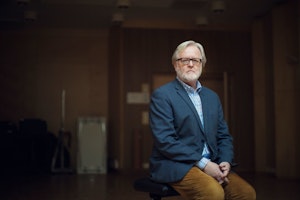“I really had hoped that the days were gone when we were being told what is good and bad art”. This statement by Norway’s then culture minister Linda Hofstad Helleland sparked debate last year, when she attacked theatrologist and theatre critic Julie Rongved Amundsen’s assessment of Norwegian history plays. Øivind Varkøy responded to the minister’s words with frustration.
“I interpret the critic’s column as a warning about artistic quality in the history play genre, and I felt that the minister was trying to shut down the debate. If, as the minister implicitly did, we brand a critic elitist, then the critic has a problem, since Norwegians are none too keen on cultural elites.”
Why do people object to others voicing their opinion about what makes art good or bad?
“So-called ‘ordinary people’ have always had an uneasy relationship with so-called ‘high culture’, and vice versa. Just look at Bourdieu’s research on the topic. Of course, it is true that those we might describe as cultural elites have had ways of thinking about art and aesthetics that have marginalised and excluded large sections of wider society. We shouldn’t dismiss that. However, it doesn't mean that we should stop talking about quality. We just need to discuss it with this in mind. As for what constitutes quality, that will always vary. It’s not a static phenomenon. And of course we have to include all arguments in this discussion. Even an arts critic must be allowed to be part of the discussion. If not, we’re left with a tyranny of the majority, a populist outlook where quality of art becomes synonymous with performances and artists that draw a large audience. It turns quality into a quantitative dimension.”
If the arts were to reject critique – which is commonplace in most other fields – it will undermine art as a specialist discipline. The question is then what is it that makes art so unsuitable as a discipline?
“It’s clear that artistic and aesthetic quality is about a discipline. It could be craftsmanship, quality of expression and so on. The problem arises when we go from talking about these qualities, which most people will agree on, to talking about the values attached to them. This is a highly complex discussion, a value-based assessment of what is important and what is less important, what we should prioritise and not prioritise. It's a moral discussion in many ways. Which values do we wish to promote?”
“That’s why I became so frustrated when the culture minister felt it necessary to signal that this was an uninteresting discussion and that it was problematic to question the quality of the scripts used in Norwegian history plays, say. In my view, it is entirely unproblematic. Maybe it’s true that many of the plays have poor scripts and that perhaps they deserve better.”
The legitimacy of music
In your last book, Musikk – dannelse og eksistens, you write that you have been working for more than 25 years to ‘legitimise music education and the intrinsic value of musical experiences’. Looking at your first point, what are the difficulties around legitimising music education?
“The challenges are many, and they are long-standing. Certain school subjects are undoubtedly having to work harder than others to justify their existence. I've never heard of maths teachers having to justify their subject. We take maths for granted. Music, on the other hand, along with other arts subjects are having a hard time. They exist on the periphery of the curriculum, so to speak.”
“If we look at the history of ideas, many people have sought to legitimise and justify music education, starting way back with Plato. Most of the arguments centre around what music is good for beyond itself. More recently the curriculum has come to embody new arguments in favour of music education, and most of those arguments identify beneficial yet non-musical objectives.”
Can you describe some of these objectives?
“Developing tolerance of foreign cultures, a general capacity for creative thinking and work, inter-generational understanding, an understanding of culture in general, national identity and, perhaps even more importantly, an understanding of multicultural identity in which the multicultural perspective has filtered into the Norwegian curriculum. Both national identity and Norwegian identity can be problematic. How do we deal with them? It’s a big political discussion. To me, Norwegian culture is an entirely unproblematic term as long as it’s not used as a static concept, as long as it’s capable of being open and accommodating more recent cultural expressions when they arrive in the country.”


